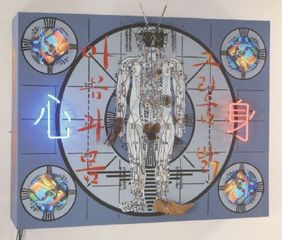Dropping off body and mind
 David A. Shaner discusses Dogen’s “dropping off body and mind”, something I’ve taken up more than once (here and here ), in “The Bodymind Experience in Japanese Buddhism: A Phenomenological Perspective of Kukai and Dogen”, an excerpt from which can be found here, in the Digital Library and Museum of Buddhist Studies, a Taiwan-based initiative.
David A. Shaner discusses Dogen’s “dropping off body and mind”, something I’ve taken up more than once (here and here ), in “The Bodymind Experience in Japanese Buddhism: A Phenomenological Perspective of Kukai and Dogen”, an excerpt from which can be found here, in the Digital Library and Museum of Buddhist Studies, a Taiwan-based initiative.
Excerpts of interest:
Shinjin datsuraku is a phrase traditionally translated as “cast off body and mind.” The importance of this phrase cannot be underestimated. It occurs throughout Shobogenzo, works by Dogen not included in Shobogenzo, and is most evident in Shobogenzo Zuimonki, which was edited by Dogen’s disciples shortly after his death…In fact, Dogen stated explicitly that this is all you need to understand Buddhism.
“From the first time you meet your master and receive his teaching, you have no need for either incense-offerings, homage-paying, nembutsu, penance disciplines, or silent sutra readings; only cast off body and mind in zazen.” (Bendowa)
“Casting off,” interpreted phenomenologically, is parallel to the neutralization of thetic positings characteristic of first order bodymind awareness. Dogen is emphatic in his emphasis that casting off is not a denunciation (negative positing) of body and mind. One must cast aside all thetic positings, for example, “accepting good” and “rejecting evil.”
In keeping with the terminology utilized throughout, it would be more accurate but also more cumbersome to translate shinjin datsuraku as “cast off the mind-aspect and body-aspect.” In other words, cast off all abstractions in order to become aware of the bodymind ground at the base of all experience.

July 29th, 2006 at 09:57
So it’s not becoming a completely blank slate, but a blank body and a blank mind, or just blank mind, maintaining awareness of our nature, but openness at the same time?
I usually describe myself as open, but I doubt I have ever been so perfectly open as this. I am a contentious student and believe that trait plus honesty, openness, and willingness to either agree or challenge has been my best teacher. If teachers had always been competent about what they were saying, I probably wouldn’t have developed this trait. What if even God is best approached this way? What if God agrees with that?